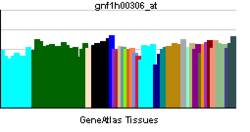HES6
| View/Edit Human | View/Edit Mouse |
Transcription cofactor HES-6 is a protein that in humans is encoded by the HES6 gene.[3][4]
Interactions
HES6 has been shown to interact with TLE1.[5]
References
- ↑ "Human PubMed Reference:".
- ↑ "Mouse PubMed Reference:".
- ↑ Bae S, Bessho Y, Hojo M, Kageyama R (Aug 2000). "The bHLH gene Hes6, an inhibitor of Hes1, promotes neuronal differentiation". Development. 127 (13): 2933–43. PMID 10851137.
- ↑ "Entrez Gene: HES6 hairy and enhancer of split 6 (Drosophila)".
- ↑ Gao X, Chandra T, Gratton MO, Quélo I, Prud'homme J, Stifani S, St-Arnaud R (Sep 2001). "HES6 acts as a transcriptional repressor in myoblasts and can induce the myogenic differentiation program". J. Cell Biol. 154 (6): 1161–71. doi:10.1083/jcb.200104058. PMC 2150829
 . PMID 11551980.
. PMID 11551980.
Further reading
- Bech P, Bolwig TG, Dein E, Jacobsen O, Gram LF (1975). "Quantitative rating of manic states. Correlation between clinical assessment and Biegel's Objective Rating Scale". Acta Psychiatr Scand. 52 (1): 1–6. doi:10.1111/j.1600-0447.1975.tb00017.x. PMID 1155198.
- Vasiliauskas D, Stern CD (2000). "Expression of mouse HES-6, a new member of the Hairy/Enhancer of split family of bHLH transcription factors". Mech. Dev. 98 (1-2): 133–7. doi:10.1016/S0925-4773(00)00443-3. PMID 11044617.
- Gao X, Chandra T, Gratton MO, Quélo I, Prud'homme J, Stifani S, St-Arnaud R (2001). "HES6 acts as a transcriptional repressor in myoblasts and can induce the myogenic differentiation program". J. Cell Biol. 154 (6): 1161–71. doi:10.1083/jcb.200104058. PMC 2150829
 . PMID 11551980.
. PMID 11551980. - Swearingen ML, Sun D, Bourner M, Weinstein EJ (2003). "Detection of differentially expressed HES-6 gene in metastatic colon carcinoma by combination of suppression subtractive hybridization and cDNA library array". Cancer Lett. 198 (2): 229–39. doi:10.1016/S0304-3835(03)00313-6. PMID 12957362.
- Gratton MO, Torban E, Jasmin SB, Theriault FM, German MS, Stifani S (2003). "Hes6 promotes cortical neurogenesis and inhibits Hes1 transcription repression activity by multiple mechanisms". Mol. Cell. Biol. 23 (19): 6922–35. doi:10.1128/MCB.23.19.6922-6935.2003. PMC 193938
 . PMID 12972610.
. PMID 12972610. - Kang SA, Seol JH, Kim J (2005). "The conserved WRPW motif of Hes6 mediates proteasomal degradation". Biochem. Biophys. Res. Commun. 332 (1): 33–6. doi:10.1016/j.bbrc.2005.04.089. PMID 15896295.
- Ball AJ, Abrahamsson AE, Tyrberg B, Itkin-Ansari P, Levine F (2007). "HES6 reverses nuclear reprogramming of insulin-producing cells following cell fusion". Biochem. Biophys. Res. Commun. 355 (2): 331–7. doi:10.1016/j.bbrc.2007.01.153. PMC 1852427
 . PMID 17300753.
. PMID 17300753. - Carey KA, Farnfield MM, Tarquinio SD, Cameron-Smith D (2007). "Impaired expression of Notch signaling genes in aged human skeletal muscle". J. Gerontol. A Biol. Sci. Med. Sci. 62 (1): 9–17. doi:10.1093/gerona/62.1.9. PMID 17301032.
- Scheffer D, Sage C, Corey DP, Pingault V (2007). "Gene expression profiling identifies Hes6 as a transcriptional target of ATOH1 in cochlear hair cells". FEBS Lett. 581 (24): 4651–6. doi:10.1016/j.febslet.2007.08.059. PMID 17826772.
External links
- HES6 protein, human at the US National Library of Medicine Medical Subject Headings (MeSH)
This article incorporates text from the United States National Library of Medicine, which is in the public domain.
This article is issued from Wikipedia - version of the 5/20/2016. The text is available under the Creative Commons Attribution/Share Alike but additional terms may apply for the media files.
